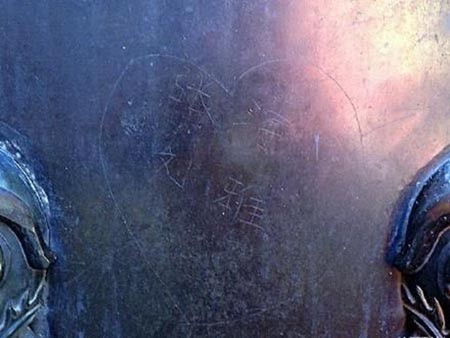A heart with the names of a man and a woman has been etched into a 300-year-old ceremonial copper vessel at the Palace Museum in Beijing, prompting the anger of netizens over another case of vandalism at the hands of Chinese tourists.
With the etching clearly visible next to the handle of a Ming Dynasty jar, social media is in an uproar over the petty vandalism of one of China's most ancient artifacts.
"Zhang Tao and Liu Ya, show your love for each other somewhere else. Carving your names into a 300-year-old artifact is a crime," said Diamond Blade on social media.
Such instances of petty vandalism are common in the Palace Museum, which was the former palace of China's emperors. One employee pointed out that this may be because of the miniscule fines placed on the offense.
According to China's laws protecting cultural relics, instances where the relic's surface is altered by drawing or carving may be fined a maximum of 200 yuan ($30). Significant damage to a piece may warrant detainment by the Ministry of Public Security, while pieces heavily damaged might lead to a lawsuit and a significant fine.
With no authority to detain suspects, the museum can send a perpetrator caught at the scene of a crime to authorities for further investigation. In case the perpetrator escapes, the museum can gather evidence and report the case to authorities.
There is a long tradition of Chinese tourists vandalizing ancient relics. Back in 2013, Liang Jiji inscribed "Liang Jiji was here" on one of the jars at the Palace Museum.
Netizens were similarly angry over the incident, with one user saying, "The Palace Museum has ordered you to go home and chop off your hand."
Some Chinese tourists have even done their crimes overseas. In 2013, a teenager carved the words "Ding Jinghao was here" on the 3,500-year-old Luxor Temple in Egypt.
The resulting online backlash led to a manhunt that produced a public apology from the boy's parents.



























